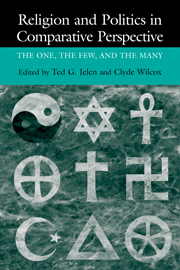Book contents
- Frontmatter
- Contents
- List of Contributors
- Preface
- 1 Religion: The One, the Few, and the Many
- 2 The Challenge of Pluralism
- 3 Catholicism, Politics, and Culture in the Republic of Ireland
- 4 Religion and Politics in Iberia
- 5 The Religious Dimension of Israeli Political Life
- 6 Between Heaven and Earth
- 7 Islamism in Contemporary Arab Politics
- 8 Religion and Politics in a Secular Europe
- 9 Religion and Democracy in South America
- 10 Looking for Hope in Central America
- 11 Religion and Politics in India
- 12 Religion and Politics in Japan
- 13 Religion and Politics in an Open Market
- 14 The Political Roles of Religion
- Index
8 - Religion and Politics in a Secular Europe
Cutting Against the Grain
Published online by Cambridge University Press: 05 June 2012
- Frontmatter
- Contents
- List of Contributors
- Preface
- 1 Religion: The One, the Few, and the Many
- 2 The Challenge of Pluralism
- 3 Catholicism, Politics, and Culture in the Republic of Ireland
- 4 Religion and Politics in Iberia
- 5 The Religious Dimension of Israeli Political Life
- 6 Between Heaven and Earth
- 7 Islamism in Contemporary Arab Politics
- 8 Religion and Politics in a Secular Europe
- 9 Religion and Democracy in South America
- 10 Looking for Hope in Central America
- 11 Religion and Politics in India
- 12 Religion and Politics in Japan
- 13 Religion and Politics in an Open Market
- 14 The Political Roles of Religion
- Index
Summary
Religious conflict is not the primary feature of the political life in Western European nations. With the exceptions of Ireland and Northern Ireland, Western Europe has the highest level of secularization in the world, with declining church membership and the retrenchment of religious belief into the private sphere. Secularization has pushed religion toward the margins of political and social life. There has been a loss of religious influence in public institutions, and the state has gradually dispossessed the Church of some of its traditional political functions. Secular forces have, without question, weakened the political impact of religion in Western Europe.
Yet religion is more significant for the politics of Western Europe than classical secularization theory would have predicted. Religion is important for the politics of specific issues, particularly immigration and education. It continues to affect the structure and content of politics for each nation, remaining an important component of party coalitions and in voter choice in virtually every Western European country. Religious influence may have dissipated in recent decades, but it certainly has not disappeared.
Religious disputes are most likely to arise in politics when outside values threaten a religious community. Lipset (1981) argued that status distinctions based on religion are often the basis of the political divisions of a society. Majority religions, often with the support of the state, subject minority religions to various types of social and political discrimination.
- Type
- Chapter
- Information
- Religion and Politics in Comparative PerspectiveThe One, The Few, and The Many, pp. 167 - 192Publisher: Cambridge University PressPrint publication year: 2002
- 8
- Cited by

